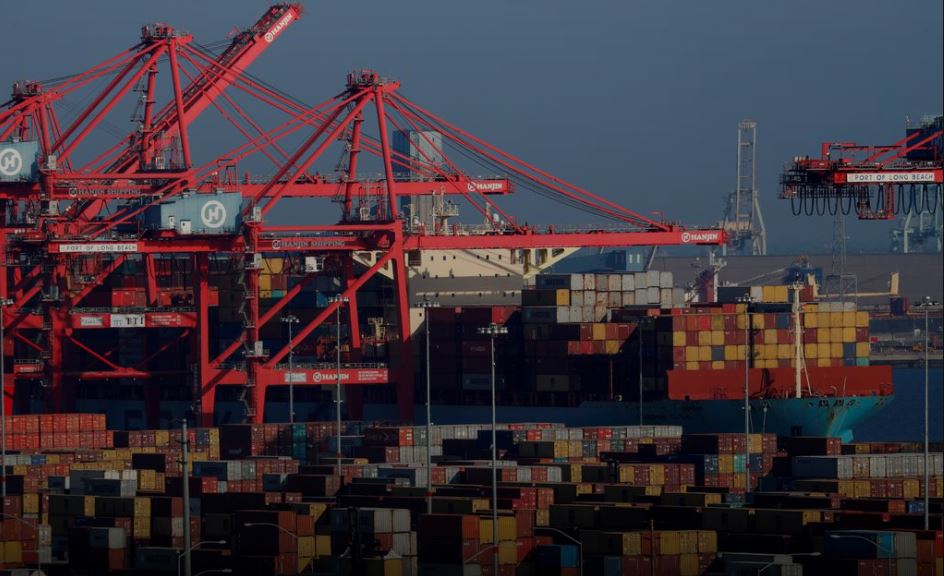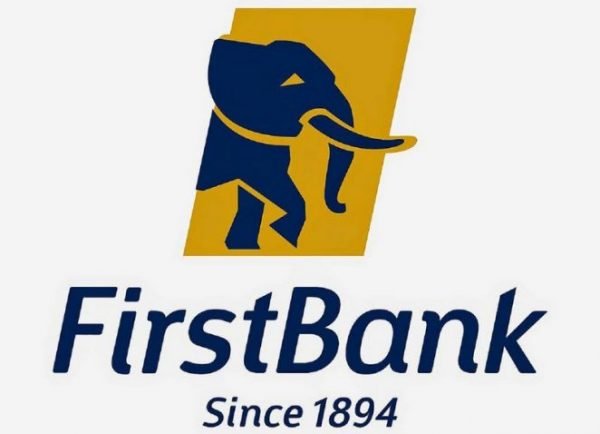Economy
U.S. Trade Deficit Hits Record High in February

The U.S. trade deficit surged to a record high in February as the nation’s economic activity rebounded more quickly than that of its global rivals.
This could remain elevated this year, with massive fiscal stimulus expected to spur the fastest growth in nearly four decades.
The economy is roaring as increased COVID-19 vaccinations and the White House’s $1.
9 trillion pandemic rescue package boost domestic demand, a chunk of which is being satiated with imports.The aggressive government intervention and the Federal Reserve’s ultra-easy monetary policy have charted a robust growth path for the economy.
The trade deficit jumped 4.
8 per cent to a record $71.1 billion in February, the Commerce Department said on Wednesday.Economists polled by Reuters had forecast a $70.5 billion deficit.
The goods trade gap was also the highest on record.
Imports slipped 0.7 per cent to $258.3 billion.
Goods imports fell 0.9 per cent to $219.1 billion.
The drop likely reflected supply-chain constraints, rather than weak domestic demand.
Indeed, imports of capital goods hit a record high, while those of industrial supplies and materials were the highest since October 2018.
“Cargo ships have been forced to anchor outside the Los Angeles and Long Beach ports, where about a third of goods imports come through.
“This is as the ports struggle to unload the incoming ships,’’ said Jay Bryson, chief economist at Wells Fargo Securities in Charlotte, North Carolina.
The U.S. in February recorded its first petroleum deficit since December 2019, likely because of higher crude prices.
Exports dropped 2.6 per cent to $187.3 billion.
Exports of goods tumbled 3.5 per cent to $131.1 billion, likely hurt by unseasonably cold weather across large parts of the country.
When adjusted for inflation, the goods trade deficit shot up to a record $99.1 billion in February from $96.1 billion in January.
The so-called real trade deficit is running well above the average for the October-December period.
That suggests trade could subtract from GDP growth in the first quarter, which would be the third straight quarterly drag.
But that is unlikely to have an impact on first-quarter GDP growth estimates, currently as high as a 10 per cent annualised rate.
The economy grew at a 4.3 per cent pace in the fourth quarter.
Economists expect growth this year could top seven per cent, which would be the fastest since 1984.
The economy contracted 3.5 per cent in 2020, the worst performance in 74 years.
The International Monetary Fund is forecasting the global economy to expand by six per cent this year, driven primarily by the U.S. economy, which the fund estimated would grow by 6.4 per cent.
From the labour market to manufacturing and the hard-hit services industries, activity accelerated sharply in March. (Reuters/NAN)
Economy
CBN Takes Steps to Strengthen Banking Sector, Issues Routine Transitional Guidance

The Central Bank of Nigeria (CBN), has introduced time-bound measures for some banks still completing their transition from the temporary regulatory support provided in response to the economic impact of the COVID-19 pandemic.
According to a statement issued by Mrs Hakama Sidi-Ali, , CBN’s Acting Director, Corporate Communications Department , this is part of its ongoing efforts to strengthen the banking system.
Sidi-Ali said that the step was part of the CBN’s broader, sequenced strategy to implement the
recapitalisation programme announced in 2023.
She said that the programme, designed to align
with Nigeria’s long-term growth ambitions, had already led to significant capital inflows and balance sheet strengthening across the sector.
“Most banks have either completed or are on track to meet the new capital requirements well before the final implementation deadline of March 31, 2026.
“The measures apply only to a limited number of banks. These include temporary restrictions on capital distributions, such as dividends and bonuses to support retention of internally generated funds and bolster capital adequacy.
“All affected banks have been formally notified and remain under close supervisory engagement ” she said.
She said that to support a smooth transition, the CBN had allowed limited, time-bound flexibility
within the capital framework, consistent with international regulatory norms.
“Nigeria generally maintains Risk-Based Capital requirements that are significantly more stringent than the global Basel III minimums.
“These adjustments reflect a well-established supervisory process consistent with global norms. Regulators in the U.S., Europe, and other major markets have implemented similar transitional measures as part of post-crisis reform efforts.
“The CBN remains fully committed to continuous engagement with stakeholders throughout this period via the Bankers’ Committee, the Body of Bank CEOs, and other industry forums,” she said.
She said that the goal to ensure a transparent, Nigeria’s banking sector remained fundamentally strong.
According to her, these measures are neither
unusual nor cause for concern.
She said that they were a continuation of the orderly and deliberate implementation of reforms already underway.
She said that the CBN would continue to take all
necessary actions to safeguard the sector’s stability and ensure a robust, resilient financial ecosystem that supports sustainable economic growth. (NAN)
Economy
Cybercrime: First Bank Invests N15bn to Protect Systems From hackers in 5 months –CEO

First Bank HoldCo Plc says it has spent more than N15 billion to protect its systems against criminals between January and June.
Olusegun Alebiosu, the Chief Executive Officer (CEO), First Bank HoldCo Plc, said this in an interview in Abuja on Wednesday.
Alebiosu, who spoke on the sideline of a two-day National Seminar on Banking and Allied Matters for Judges, said the Bank had spent three N3 billion in June to protect its systems.
He said the bank had the best cyber security framework in the country, hence the investment.
The CEO who was speaking on the increasing number of attacks by cybercriminals, especially on banks’ systems, assured First Bank customers of the safety of their monies.
Alebiosu frowned at the rate at which some citizens were involved in cybercrimes, saying the country must move fast to curb their excesses.
”No customer would lose their money in First Bank unjustly.
”If their money is missing in First Bank, First Bank will pay back.
”Before I joined First Bank, I have an account with First Bank.
”One of the reasons why I had an account with First Bank was, I said to myself, if my money is missing, it is the only bank I know I will collect my money without any excuses, ” he said.
Reacting to some customers’ complaints on the delay by the bank to handle cases of fraudulent transactions, Alebiosu said the bank must conduct investigations involving different stakeholders.
The CEO said the delay was caused by the collaboration between the stakeholders involving security agencies and banks where the money was transferred to determine the realities about the cases.
He urged customers to tread carefully in handling and releasing their financial information.
”Customers themselves, most times, also compromise their own security details; I have seen a lot of people that give their cards to somebody to help them withdraw money from their ATM.
”They compromise their password so, when something happens and you say, my money disappeared, you forget the day you gave your card to someone else and they can use that to transfer your money.
”Some people compromise even their own ID on the system carelessly, some give their Bank Verification Number (BVN) and they use it against them.
”Now, why does it take time for the bank to react, everything you give to the bank, the bank has to investigate it.
”The money might have gone to other banks so, you start tracking from other banks but
Sometimes customers are impatient,” he said.
On frauds allegedly perpetrated by staff, he said the bank had internal employee fraud software, that monitors activities of employees on the system.
According to him, if you know how many of our staff we sack on a monthly basis, you won’t believe me.
”So if there are triggers, people will be involved. It is for us to run faster than them, and see how we can help to stop these kinds of things in our system but wherever we see it, we deal with it decisively, ” Alebiosu said.
He said that various stakeholders including the banks, law enforcement agencies and the judiciary had a role to play in curbing cybercrimes. (NAN)
Economy
GTCO Begins Deduction of USSD Fee From Airtime Balance

Guaranty Trust Holding Company (GTCO), says it will begin the deduction of Unstructured Supplementary Service Data (USSD fee from the airtime balance of its customers from June 18.
The bank in a message to its customers on Wednesday, said the N6.98 fee would no longer be deducted from customers’ bank account balance.
”Dear Customer, please be informed that effective June, 18, the N6.
98 USSD fee will be deducted from your airtime balance, no longer from your bank account”.The Nigerian Communications Commission (NCC) had directed deposit money banks (DMBs) to stop deducting charges for USSD transactions directly from customers’ accounts. (NAN)



























